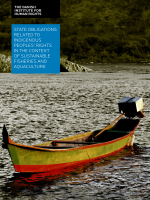
State obligations related to indigenous peoples' rights in the context of sustainable fisheries and aquaculture
This brief examines states obligations in relation to indigenous peoples’ rights in the context of fisheries and aquaculture and it is suggested that action in four main areas is urgently required. Those four main areas are:
- Recognizing indigenous peoples’ rights to marine resources, marine territories and coastal lands
- Safeguarding the environment of indigenous peoples’ territories, including marine and coastal ecosystems
- Protecting and supporting indigenous peoples’ livelihoods based on fisheries and aquaculture and ensuring access to decent work
- Ensuring consultation and participation of indigenous peoples in the formulation, implementation, monitoring and evaluation of legislation, policies and programmes concerning fisheries and aquaculture and other decision-making processes affecting them.
The brief also looks at the 2030 Agenda which is underpinned by human rights obligations. The 2030 Agenda provides States with an integrated rights-based framework to guide holistic fulfilling of States’ obligations in relation to indigenous peoples in the context of fisheries and aquaculture. In that endeavour, States can build on the analysis, data and recommendations provided by existing human rights mechanisms.
Links to SDG targets, guidance to States on key steps for implementation, and case examples are provided for each of the four main areas requiring immediate actions by states.
We strive to make the pdf versions of our publications etc. accessible for screen readers. If you experience any problems, please contact Digital Editor Stine Juhl Nielsen on stni@humanrights.dk
